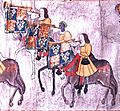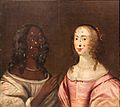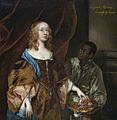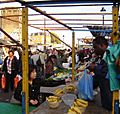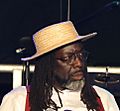Black British people facts for kids
| Total population | |
|---|---|
| 1,904,684 (3.0%) (2011 census) |
|
| Regions with significant populations | |
| 1,846,614 (3.5%) (2011 census) | |
| 36,178 (0.7%) (2011 census) | |
| 18,276 (0.6%) (2011 census) | |
| Northern Ireland | 3,616 (0.2%) (2011 census) |
| Languages | |
| English (British English, Black British English, Caribbean English, African English), Creole languages, French, languages of Africa, other languages | |
| Religion | |
| Predominantly Christianity (69%); minority follows Islam (15%), Traditional African religions and other faiths (8%) or are irreligious (6%) 2011 census, Great Britain only |
|
Black British people are British citizens of either Black African descent or of Black African-Caribbean (sometimes called "Afro-Caribbean") background and include people with mixed ancestry from either group.
The 2011 UK census says there are 1.9 million Black British people. They are about 3% of the population of the United Kingdom.
In the past, Black British used to mean any immigrant who was not English, like British Asians, but people say that it was because of racism in England at that time.
Images for kids
-
Extract from the Westminster Tournament Roll almost certainly showing John Blanke, the only figure wearing a brown turban latticed with yellow.
-
Dual portrait of a black woman and a white woman, identities unknown, circa 1650, by an anonymous hand. The two women, who appear to be of equal standing, are wearing face patches, which were a fashion of the time. The painting is captioned "I black with white bespott y white with blacke this evil proceeds from thy proud hart then take her: Devill."
-
A 1651 painting of Scottish noblewoman Elizabeth Maitland, Duchess of Lauderdale with her black servant
-
Members of the British West Indies Regiment on the Somme, September 1916. All of the men pictured were Afro-Caribbean people who volunteered to fight for the British Army.
-
The Empire Windrush is extremely important within Black British history; in 1948 it carried the first large wave of Jamaican immigrants to the United Kingdom.
-
Ridley Road Market in Dalston, London, which sells Afro-Caribbean music, textiles, and food including goat meat, yams, mangos and spices.
-
Firefighters douse a shop and flats destroyed by arson during the initial rioting in Tottenham.
-
Ghanaian independence day celebrations in the London Borough of Barnet.
-
Billy Waters busking in London during the early 19th century.
-
A Crimean War nurse, Mary Seacole has been dubbed the "Greatest Black Briton."
-
Olaudah Equiano, a significant figure involved with the abolition of the Atlantic Slave Trade.
-
Lord Sentamu, a former archbishop of York, the second most senior clerical position in the Church of England.
-
A prominent social care charity administrator, Lord Adebowale is currently a Crossbench member of the House of Lords.


